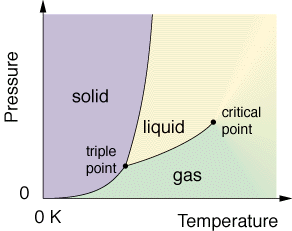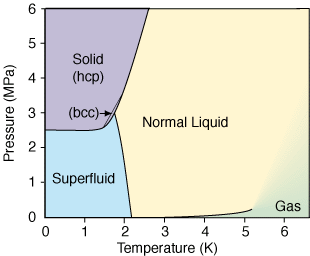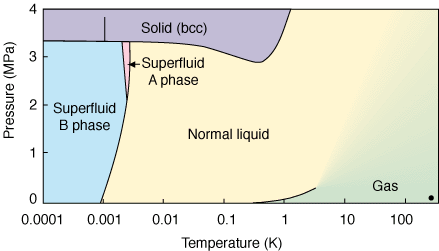PHYSICS 540 -- Statistical Mechanics
Fall Semester 2005
course web page http://felix.physics.sunysb.edu/~allen/540-05/
Instructor: Philip
B. Allen (philip.allen@sunysb.edu)
office Physics B-146;
hours: Wed 1-2; Fri 10-11
The class will meet in Physics
B-131, TuTh 8:20-9:40 am
TA: Itai Ryb (iryb@grad.physics.sunysb.edu)
office: Physics D-118 telephone: 2-4712

The typical solid-liquid-gas phase diagram. I took this and the
two helium phase diagrams from the web
page of the theory group of the Helsinki University of Technology. |

The 4He phase diagram, with two quantum modifications: (a)
zero-point motion destabilizes the solid at low P; (b) the low T liquid
acquires macroscopic quantum properties. |
PHY 540 Statistical Mechanics
Brief review of thermodynamics, principles of
physical statistics, systems of non-interacting
particles: Boltzmann, Fermi-Dirac, and Bose-
Einstein statistics. Applications to ideal
gases, electrons and phonons in solids, and
black body radiation. Approximate treatment
of non-ideal gases. First-order and second order phase transitions.
Ising model, transfer
matrix, and renormalization group approach.
Fluctuations in thermal equilibrium, fluctuation-
dissipation theorem, brief review of nonequilibrium fluctuations. Basic
notions of
ergodicity, classical and quantum chaos.
Spring, 3 credits, ABCF grading |

The 3He phase diagram, with quantum properties altered from
4He
because the nuclei are fermions rather than bosons. |
course schedule
midterm
exam Thur. Oct. 20
8:20-9:40 solutions
final
exam Tuesday Dec.
20, 8-10:30am solutions
|
Texts:
C. Kittel, Elementary Statistical Physics, Dover Publications
$14.95 ISBN: 0486435148
E. A. Jackson, Equilibrium Statistical Mechanics,
Dover $9.95 ISBN: 0486411850
booklist
|
assignment schedule
Homework
#1 due Tue Sep 6
Homework
#2 due Tue Sep 13
Homework
#3 due Tue Sep 20
Homework
#4 due Tue Sep 27
Homework
#5 due Tue Oct 11
Homework
#6 due Tue Oct 25
Homework
#7 due Tue Nov 1
Homework
#8 due Tue Nov 8
Homework
#9 due Tue Nov15
Homework#10
due TueNov22
Homework#11
due Tue Dec 6
Homework#12
for practice
Practice
problem#1 |
Numbers
to memorize [pdf
version]
Typos! click
here to find errors in Kittel's text, and email me if you find others.
Violating
the second law: design an engine and figure out why it doesn't work.
Scaling
and power law functions
Notes (pdf format)
Joseph
Black and latent heat
Bent's
essay on Sadi Carnot
phase
diagrams
Solutions
Itai's
solutions
practice
problem 1
Advice
for the final exam |
| |
|
|
|
|
|
|
|
|
|
Syllabus for Fall 2005
I. Aims of the course: To teach the basic theory, enabling you
to apply thermodynamic thinking to real world and research situations of
all kinds.
II. Procedures and Requirements: There will be homework problems
assigned (10 problem sets over the semester.)
III. Grading: A good, B passing; C unsatisfactory Basis:
Homework 40% Midterm 15% Final exam 35% Attendance and Participation 10%
IV Required
texts:
(1) C. Kittel, Elementary
Statistical Physics, Dover, 1958 (ISBN 0486435148); (2) E. Atlee
Jackson,
Equilibrium
Statistical Mechanics, Dover, 1968 (ISBN 0486411850). Both
are required.
V. Academic Honesty: Discussions with fellow students are
strongly encouraged, but work which is submitted for grading must be your
own words and thoughts. You should review the definition of plagiarism.
VI.Americans with Disabilities Act: If you have a physical, psychological,
medical or learning disability that may impact your course work, please
contact Disability Support Services, ECC (Educational Communications Center)
Building, room 128, (631) 632-6748. They will determine with you
what accommodations are necessary and appropriate. All information and
documentation is confidential.
Students requiring emergency evacuation are encouraged to discuss their
needs with their professors and Disability Support Services. For procedures
and information, go to the following web site.
<http://www.ehs.sunysb.edu/fire/disabilities/asp>
latest revision: PBA, 09-14-05


